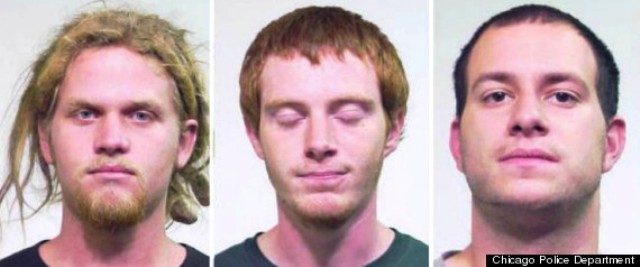NATO 3 Lose Bid To Have Terrorism Charges Dropped
By Chuck Sudo in News on Mar 28, 2013 2:00PM

Brent Betterly, Brian Church and Jared Chase have been charged in an alleged NATO summit terror plot. (Chicago Police Department booking photos.)
The three out-of-town activists collectively known as the NATO 3 were dealt another blow Wednesday when a Cook County judge rejected their motion to dismiss the terrorism charges against them. Judge Thaddeus Wilson ruled that the Illinois terrorism statute was “constitutional on its face” but that attorneys for Brent Vincent Betterly, 24, of Oakland Park, Fla., Jared Chase, 24, of Keene, N.H., and Brian Church, 20, of Fort Lauderdale, Fla. could still argue the law is unconstitutional when the case goes to trial in the fall.
Betterly, Chase and Church were arrested in a police raid last year and charged with conspiracy to commit terrorism, possession of an explosive or incendiary device and providing material support for supposedly conspiring to make Molotov cocktails and target the homes of President Barack Obama and Mayor Rahm Emanuel prior to the NATO summit, and pleaded not guilty last summer.
Attorney Michael Deutsch of the People’s Law Office, representing Church, filed a motion last month claiming the terrorism statute was a violation of First Amendment rights because it’s overly broad as written. After Wilson’s ruling, Deutsch said he had a feeling the motion would be dismissed but that all wasn’t lost as they could still argue against the ruling at the trial.
Chase’s attorney, Thomas Durkin, claimed authorities “selectively” used the anti-terrorism statute against the NATO 3.
“It’s what a lot of scholars and people who pay attention to national security call the ‘new normal.’ That is, because the terrorism statute is in play, you end up having police officers sitting in bullet proof vests in the court room. Over time, you’ve got what legal scholars call ‘seepage,’ in which these ‘new normals’ start seeping into the court room incrementally.”